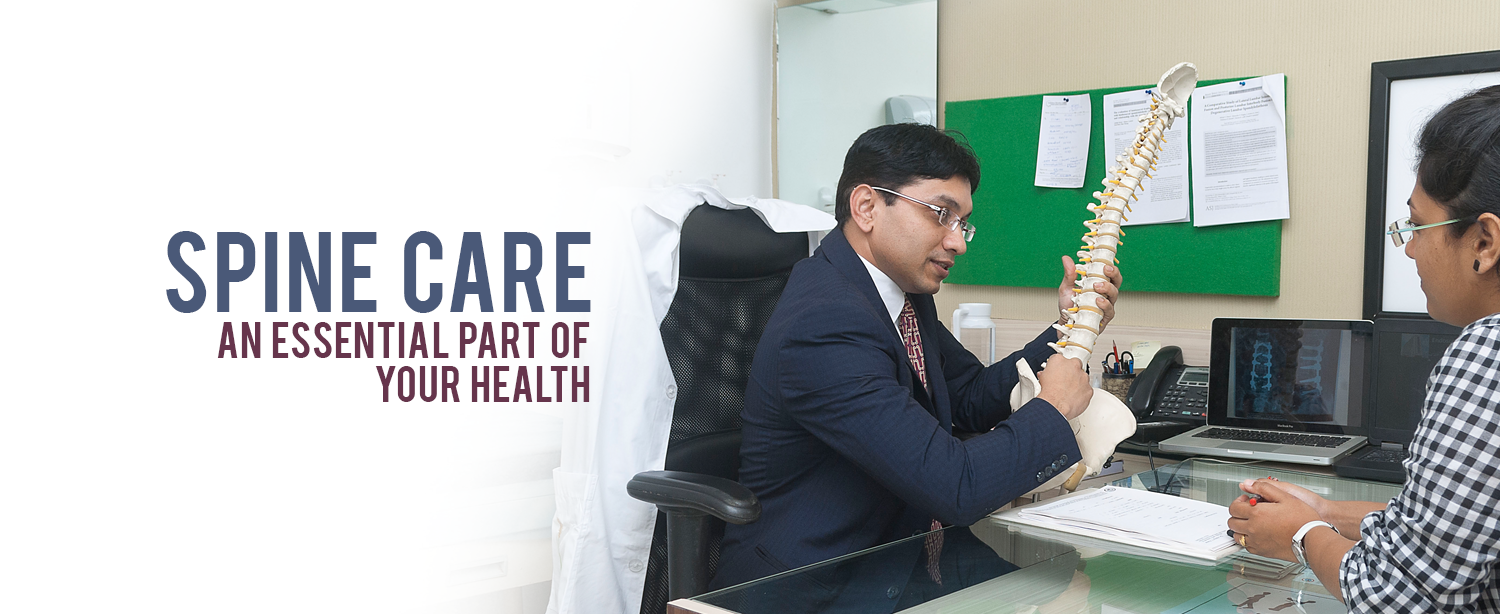Spine care is an essential part of your health. The three main functions of the spine are to: 1. Protect the spinal cord, nerve roots and several of the body’s internal organs. 2. Provide structural support and balance to maintain an upright posture. 3. Enable flexible motion. Your spine allows your body to be in a stable and upright position. A strong spine and good posture are essential to healthy mobility, a painful spine can eliminate it.
Your spine is a part of the central nervous system, along with the brain, and relies on the peripheral nervous system: the millions of nerves that send messages to the brain that control the body’s functions. An unhealthy spine interferes with this entire system, causing a host of unwelcome health issues such as pain, numbness, and weakness in the arms and legs, digestion and impaired control of the bowel and bladder.
Spine disorders:
Here are a few common spine disorders that affect people:
- Degenerative disc disease is a normal part of aging that often occurs along with spinal stenosis. Over time, stressors and minor injuries cause the spinal discs to gradually degenerate, shrinking the space between discs and causing instability and nerve compression.
- Slip disc can occur as a result of injury, fall or repetitive motion or as a part of normal ageing process.
- Spondylolisthesis occurs when one vertebra slips forward on the vertebra below it. It causes immense back pain.
- Kyphosis is an abnormal forward curve in the upper part of the spine. It is typically found in older women but it may occur in any age. Severe Kyphosis may also cause fractures of the vertebrae.
- Osteoporosis typically occurs in post menopausal women and may contribute to vertebral fractures.
- Sciatica is caused by irritation of the root(s) of the lower lumbar and lumbosacral spine.
- Spinal Stenosis is the narrowing of the spinal canal that often accompanies degenerative disc disease and is typically seen in people over 60. It progresses slowly over time and causes back and leg pain during activity.
- Scoliosis is a sideways curvature of the spine that occurs during growth spurts before puberty or as a result of arthritis, spinal injury or other spinal disorders. Most cases are mild, but severe cases can be disabling too.
Strengthen your spine
Do you slouch?
Slouching is the reason why 80% people suffer from spinal problems.
Here are a few tips to help you take better care of your spine and back:
1. Good posture is essential
Maintaining an erect good posture is the key to a healthy spine and helps prevent many spine problems.
2. Deep belly breathing
This can help improve your posture. Place your hands on your abdominal area and feel your belly move as you inhale and exhale. Do this as many times a day as possible to improve your posture and overall spinal health.
3. Exercise for good spine health
Just 10 minutes per day is all you need to perform some simple spine-strengthening exercises. Neck stretches, shoulder exercises, including bending and extension range-of-motion exercises can dramatically improve the health of the cervical spine.
4. Eat healthy for your spine
You may not think that your diet affects your spine, but it actually plays a key role. A healthy diet consisting mostly of lean proteins, healthy fats and lots of fresh fruits and vegetables is ideal for building a lean body and muscles that support the spine.
5. Get some sunlight
Sunlight contains vitamin D, which is required for strong bones, including the spinal column, and is manufactured in the body through sun exposure. Try to spend 10 to 20 minutes in sunlight daily.
6. Check your sleep pattern
Studies suggest that insufficient sleep is associated with increased neck and back problems. Sleep in a position that enables the spine to relax, the idal being on your side. Choose a suitable mattress as well as pillow for proper neck support.
7. Don’t hesitate to meditate
People who meditate tend to focus on their core, automatically straightening their spines in the process.
Stop these mistakes!
Here are a few mistakes that may ruin or worsen your spine problems:
- Ignoring your pain for too long – If back pain continues for a few days do not ignore. Do not just reply on self medication. Consult a spine expert for correct diagnosis and treatment.
- Choosing surgery too quickly – Do not take hasty decisions. It is recommended to try non-surgical treatments for at least several weeks or months before considering surgery.
- Poor sitting posture – Do you work for long hours at your desk in a poor posture? It is time to correct it with ergonomics.
- Excess mobile usage – Excessive texting or seeing your cell phone for long hours can cause repeated stress injury and pain in the neck. This is called text neck.
- Remaining inactive – If you are in pain, one or two days of doctor-recommended rest is fine. However, over time lack of activity will in fact lead to more pain. Consult a physiotherapist for a daily exercise routine that suits your spine.
Are you or a family member suffering from a spine injury or a chronic back ache? Get yourself checked, consult experts at our Centre for Bone and Joint for further help. Please find below link for more details:
https://www.kokilabenhospital.com/departments/centresofexcellence/centrefor_bonejoint.html


